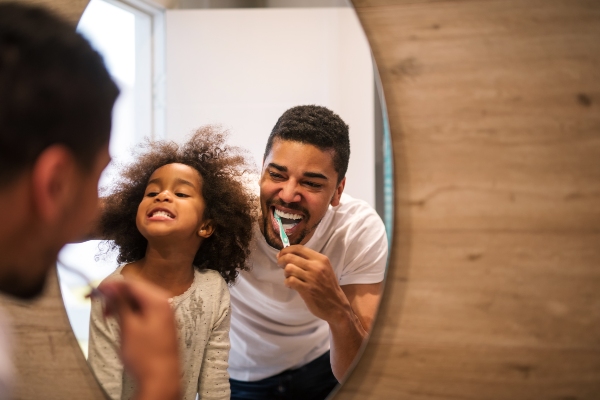Pediatric Dentist FAQs: Permanent and Baby Teeth

You may have questions about your child’s teeth that a pediatric dentist can answer. For example, you might be wondering why you should take your child to a pediatric dentist. You may also wonder why baby teeth are so important. Read on to learn the answers to your dental questions.
What is a pediatric dentist?
Both a general and pediatric dentist go to dental school for several years. However, after dental school, a pediatric dentist will receive two to three years of additional training. This training helps the pediatric dentist learn how to identify issues that relate to children. Babies, preschoolers, preteens and teens all need a different approach when it comes to oral health. A pediatric dentist also has more experience than a general dentist in caring for children’s teeth.
Why are baby teeth important if they only fall out?
The enamel on baby teeth is not as strong as on adult teeth. This means that children are more prone to getting cavities. If these cavities are not treated, children can have painful infections that interfere with daily life. One study found that about 43% of children ages two to 19 had cavities. These cavities often resulted from poor oral hygiene and too many sugary foods. The baby teeth have several other functions as well, including:
- Promoting the development of muscles and jaws
- Guiding permanent teeth into position
- Helping children talk
- Allowing for eating and chewing
Is teeth grinding normal?
About half of children experience teeth grinding during the night. The majority of these children outgrow the habit. This will usually happen when more adult teeth grow in the mouth. Because baby teeth will fall out, bruxism in young children is usually not harmful. A pediatric dentist can keep an eye on the teeth of a child who bruxes. The pediatric dentist may recommend a mouthguard.
Why do the adult teeth look odd?
A child’s primary teeth are whiter than an adult’s teeth. Baby teeth are also known as “milk teeth” because of the white color. As adult teeth replace the baby teeth, the adult teeth can look yellow by comparison. However, this is only an illusion. When all the adult teeth have come in, the teeth will most likely have a more natural appearance.
As the adult teeth come in, a parent may notice ridges on the biting portion of the front teeth. These are known as developmental ridges, or mamelons. The ridges help the teeth break through the gum. As the child uses these teeth normally, the ridges will gradually wear down. This process takes more time for some children than others.
Visit a pediatric dentist today
It is important to know more about your child’s baby and adult teeth. This can help you better recognize if your child is experiencing any issues. For example, bruxing is normal now but can be a problem later. On the other hand, cavities in the baby teeth should be treated quickly. Visiting a pediatric dentist can help any other issues be addressed.
Request an appointment here: https://nettsmiles.com or call Nett Pediatric Dentistry & Orthodontics at (623) 759-7658 for an appointment in our Phoenix office.
Check out what others are saying about our services on Yelp: Read our Yelp reviews.
Recent Posts
A kid-friendly dentist can treat a range of oral health concerns. However, their primary focus is helping children prevent oral health concerns from developing through good oral hygiene at home. This includes offering educational services to ensure parents and children have all of the information they need to keep a consistent oral care routine and…
Braces can help transform a child's misaligned teeth. However, it can be challenging to navigate the discomfort that comes through them. A kids orthodontist can help you manage your child's braces pain with a combination of practical strategies and patience. With the right approach, children can comfortably adapt to their orthodontic treatment and maintain a…
Parents who hear the term pediatric dental crowns during a checkup often feel surprised and a little anxious about what this treatment entails. However, the only difference between these crowns and adult crowns is that they are made for children's teeth. They protect and restore primary teeth damaged by decay, chips, cracks, or other issues.…
A kid-friendly dentist can treat a plethora of oral health concerns, including toothaches. Understanding the methods a kid-friendly dentist uses to diagnose the underlying cause of a toothache and promptly treat it can help patients feel more comfortable about the visit. Kid-friendly dentists also help with toothache prevention, effectively improving the way children view the…


